Comprehensive Guide to Garden Maintenance in Kingston
Introduction to Garden Maintenance
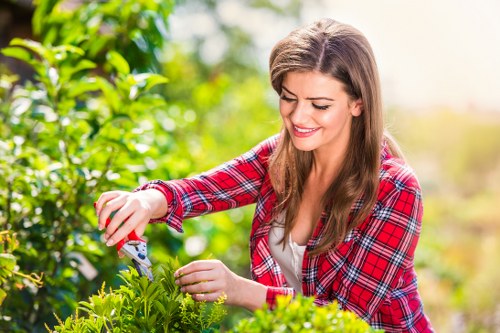
Maintaining a beautiful and thriving garden in Kingston requires a blend of passion, knowledge, and consistent effort. Whether you're a seasoned gardener or a novice, understanding the essentials of garden maintenance can transform your outdoor space into a lush, inviting retreat.
Kingston's unique climate and soil conditions present both opportunities and challenges for gardeners. By implementing effective garden maintenance strategies, you can ensure your plants flourish throughout the year.
In this guide, we'll explore key aspects of garden maintenance in Kingston, from soil preparation and planting to pest control and seasonal care.
Understanding Kingston's Climate
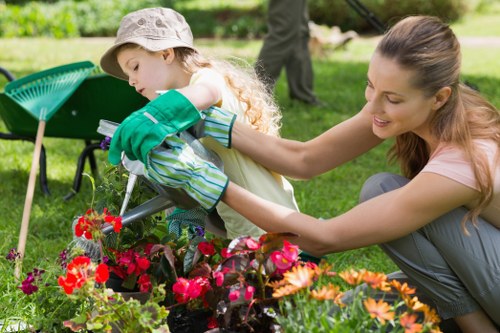
Kingston boasts a temperate climate, characterized by warm summers and mild winters. This climate is ideal for a diverse range of plants, but it also requires specific maintenance practices to address seasonal variations.
Summer in Kingston can be quite warm, necessitating regular watering and mulching to retain soil moisture and protect plant roots from heat stress. Conversely, the winter months, while milder than harsher climates, still require gardeners to prepare their gardens for cooler temperatures.
Understanding these climatic patterns is crucial for scheduling planting, fertilizing, and other maintenance tasks to align with the natural growth cycles of your garden plants.
Soil Preparation and Health
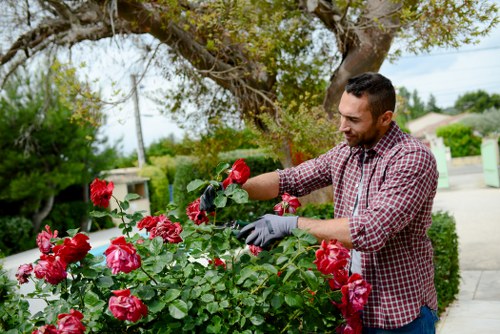
Healthy soil is the foundation of any successful garden. In Kingston, the soil can vary, so it's essential to assess and amend it to meet the needs of your chosen plants.
Begin by testing your soil's pH and nutrient levels. Most garden plants thrive in slightly acidic to neutral soil (pH 6.0-7.0). If your soil is too acidic or alkaline, you can adjust it using lime or sulfur, respectively.
Incorporating organic matter, such as compost or well-rotted manure, enriches the soil, improves its structure, and enhances moisture retention. Regularly adding mulch not only conserves moisture but also suppresses weeds and regulates soil temperature.
Choosing the Right Plants
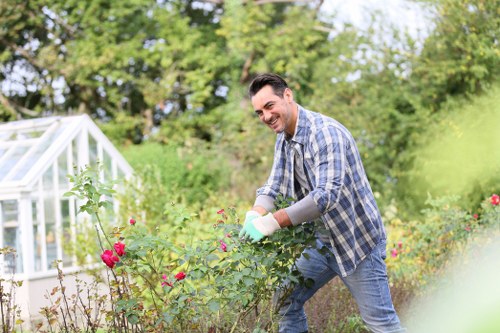
Selecting plants that are well-suited to Kingston's climate and soil conditions is vital for a thriving garden. Native plants, in particular, are adapted to the local environment and often require less maintenance.
Consider factors such as sunlight exposure, water requirements, and growth habits when choosing plants. Grouping plants with similar needs together can make maintenance more manageable and promote healthier growth.
It's also beneficial to incorporate a mix of perennials and annuals to ensure year-round interest and continuous blooms throughout the seasons.
Watering Techniques
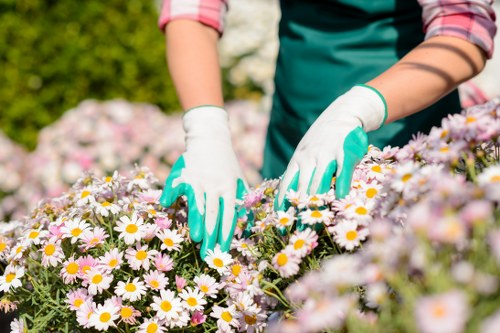
Proper watering is crucial for garden maintenance in Kingston. Overwatering can lead to root rot and other fungal diseases, while underwatering can stress plants and inhibit growth.
Implementing efficient watering techniques, such as drip irrigation or soaker hoses, ensures that water is delivered directly to the plant roots, minimizing evaporation and waste. Early morning watering is recommended to reduce the risk of fungal infections and allow plants to dry before nighttime.
Monitoring soil moisture levels and adjusting watering schedules based on seasonal changes can help maintain optimal conditions for your garden.
Pruning and Deadheading

Regular pruning and deadheading are essential practices in garden maintenance that promote healthy plant growth and enhance the overall appearance of your garden.
Pruning helps remove dead or diseased branches, encourages new growth, and maintains the desired shape of plants. It's best performed during the plant's dormant season or after flowering, depending on the species.
Deadheading, the removal of spent flowers, stimulates further blooming and prevents plants from expending energy on seed production. This practice keeps plants looking fresh and vibrant throughout the growing season.
Pest and Disease Management

Pests and diseases can pose significant threats to garden health. Effective garden maintenance includes proactive measures to prevent and control these issues.
Implement integrated pest management (IPM) strategies, which combine biological, cultural, and chemical controls to manage pest populations sustainably. Encourage beneficial insects, such as ladybugs and predatory beetles, which naturally keep pest numbers in check.
Regularly inspect plants for signs of pests or diseases and address issues promptly to prevent them from spreading. Using organic or environmentally friendly pesticides can minimize harm to beneficial organisms and the broader ecosystem.
Fertilizing and Nutrition

Providing plants with the necessary nutrients is a key aspect of garden maintenance. Fertilizing helps replenish soil nutrients that plants deplete over time, ensuring robust growth and vibrant blooms.
Choose fertilizers based on your soil test results and the specific needs of your plants. Organic options, such as compost, bone meal, and fish emulsion, offer slow-release nutrients and improve soil health.
Applying fertilizer at the appropriate times—typically during the growing season—supports plants when they need it most. Avoid over-fertilizing, which can lead to excessive foliage growth at the expense of flowers and can harm the environment.
Seasonal Garden Care

Adapting your garden maintenance practices to the seasons ensures continual plant health and garden beauty throughout the year in Kingston.
Spring: Early spring is ideal for planting new perennials, preparing beds, and applying compost. It's also a good time for pruning certain shrubs and trees before new growth begins.
Summer: Focus on regular watering, mulching, and deadheading. Monitor for pests and diseases, and provide additional support to plants as needed to withstand the heat.
Autumn:
As temperatures cool, clean up fallen leaves and debris to reduce the risk of disease. Plant bulbs for spring blooms and prepare your garden beds for winter by adding mulch or compost.
Winter:
Protect sensitive plants from frost by using row covers or moving potted plants indoors. Plan your garden layout for the upcoming year and conduct any necessary repairs to tools and structures.
Tools and Equipment

Having the right tools and equipment is essential for efficient garden maintenance. Investing in quality tools can make tasks easier and prolong the life of your plants.
Basic gardening tools include pruners, spades, hoes, rakes, and watering equipment. Keeping these tools clean and well-maintained prevents the spread of diseases and ensures they function effectively.
Consider ergonomic tools to reduce strain during extended gardening sessions. Additionally, storage solutions, such as sheds or tool racks, keep your equipment organized and easily accessible.
Organic Gardening Practices

Embracing organic gardening practices promotes a healthy environment and sustainable garden maintenance in Kingston.
Utilize organic fertilizers and pest control methods to reduce chemical usage and protect beneficial insects. Composting kitchen and garden waste recycles nutrients back into the soil, enhancing its fertility naturally.
Integrate crop rotation and companion planting to manage soil health and deter pests without relying on synthetic interventions. These techniques foster a balanced ecosystem that supports plant growth and resilience.
Professional Garden Maintenance Services

While DIY garden maintenance is rewarding, sometimes enlisting professional help can ensure optimal results, especially for larger or more complex gardens.
Professional garden maintenance services in Kingston offer expertise in areas such as landscaping design, specialized pruning, soil analysis, and pest management. They can tailor their services to meet the specific needs of your garden, saving you time and effort.
Hiring professionals also provides access to advanced tools and techniques that might be otherwise unavailable, enhancing the overall health and aesthetic of your garden.
Creating a Sustainable Garden

Sustainability is a growing focus in garden maintenance, aiming to minimize environmental impact while maintaining garden beauty.
Implement water-saving techniques, such as rainwater harvesting and efficient irrigation systems, to reduce water consumption. Choosing native and drought-resistant plants further supports a sustainable garden by requiring less water and maintenance.
Reduce waste by composting organic materials and recycling plant debris. Sustainable gardening practices not only benefit the environment but also create a healthier and more resilient garden ecosystem.
Maximizing Garden Aesthetics

Beyond plant health, garden maintenance involves enhancing the visual appeal of your outdoor space. Thoughtful design and maintenance practices can create a harmonious and inviting environment.
Incorporate a variety of plant textures, colors, and heights to add depth and interest. Strategic placement of decorative elements, such as garden ornaments, pathways, and lighting, can further elevate the aesthetic appeal.
Regular maintenance, including weeding, pruning, and mulching, ensures that your garden remains tidy and attractive, reflecting your personal style and enhancing your property's overall value.
Maintaining Garden Structures

Garden structures, such as fences, pergolas, and sheds, play a significant role in both the functionality and appearance of your garden. Proper maintenance of these structures ensures their longevity and safety.
Regularly inspect structures for signs of wear, damage, or pests. Addressing issues promptly, such as repairing broken boards or treating wood for termites, prevents further deterioration.
Cleaning and repainting or staining wooden structures protect them from the elements and maintain their aesthetic appeal. Ensuring that all structures are stable and secure contributes to a safe and enjoyable garden space.
Lighting and Irrigation Systems

Efficient lighting and irrigation systems are integral components of garden maintenance, enhancing both functionality and ambiance.
Outdoor lighting not only highlights key garden features but also extends the usability of your garden into the evening hours. Solar-powered lights are an eco-friendly option that reduces energy consumption.
Automated irrigation systems ensure consistent watering, reducing the risk of over or under-watering. Regular maintenance of these systems, including checking for leaks and adjusting timers, ensures they operate effectively throughout the growing season.
Companion Planting for a Healthy Garden

Companion planting involves growing compatible plants together to enhance growth, deter pests, and improve overall garden health.
For example, planting basil alongside tomatoes can repel harmful insects and promote better tomato flavor. Similarly, marigolds can deter nematodes when planted with various vegetables.
Understanding the relationships between different plant species allows you to create a synergistic garden environment where plants support each other's growth and resilience.
Weed Control Strategies

Weeds compete with garden plants for nutrients, water, and light, making effective weed control a critical aspect of garden maintenance.
Implementing mulching techniques suppresses weed growth by blocking sunlight and creating a barrier against weed seeds. Regular manual weeding is also essential, especially during the early stages of weed growth.
Using landscape fabric or other protective coverings can provide long-term weed suppression, reducing the need for chemical herbicides and maintaining a clean, organized garden space.
Encouraging Pollinators

Pollinators, such as bees, butterflies, and hummingbirds, play a vital role in the health and productivity of your garden.
Planting a variety of nectar-rich flowers attracts these beneficial creatures, promoting pollination and enhancing plant reproduction. Providing habitats, such as bee hotels or butterfly gardens, supports diverse pollinator populations.
A healthy pollinator presence not only improves the yield of your garden but also contributes to the broader ecosystem's balance and sustainability.
Improving Soil Fertility Naturally

Enhancing soil fertility without relying on chemical fertilizers supports a sustainable and healthy garden ecosystem.
Incorporate green manures and cover crops, such as clover or rye, which enrich the soil with organic matter and fix nitrogen naturally. Rotating crops each season prevents nutrient depletion and reduces the risk of soil-borne diseases.
Regularly adding compost and utilizing techniques like vermiculture (worm composting) further enhance soil structure and fertility, providing a rich foundation for plant growth.
Dealing with Common Garden Problems

Gardening in Kingston, like anywhere else, comes with its set of challenges. Being prepared to address common garden problems ensures your maintenance efforts are effective and your garden remains healthy.
Disease Management: Fungal infections, such as powdery mildew and rust, can affect a wide range of plants. Ensure good air circulation, avoid overhead watering, and remove infected plant parts promptly to control the spread.
Pest Control: Common pests in Kingston gardens include aphids, slugs, and caterpillars. Use organic deterrents, introduce natural predators, and maintain plant health to minimize pest infestations.
Benefits of Regular Garden Maintenance

Consistent garden maintenance offers numerous benefits, enhancing both the aesthetics and functionality of your outdoor space.
- Healthier Plants: Regular care ensures plants receive the necessary nutrients, water, and protection from pests and diseases.
- Enhanced Beauty: A well-maintained garden is visually appealing, providing a serene and inviting environment for relaxation and enjoyment.
- Increased Property Value: A lush, well-kept garden can significantly enhance the curb appeal and overall value of your property.
- Environmental Benefits: Healthy gardens support biodiversity, promote pollinator populations, and contribute to a balanced local ecosystem.
Tips for Sustainable Garden Maintenance

Adopting sustainable practices in your garden maintenance routine ensures long-term health and minimizes environmental impact.
- Use Native Plants: Native species are adapted to local conditions, requiring less water and maintenance while supporting local wildlife.
- Reduce Chemical Usage: Opt for organic fertilizers and pest control methods to maintain soil health and protect beneficial organisms.
- Conserve Water: Implement rainwater harvesting, mulching, and efficient irrigation systems to minimize water waste.
- Compost Regularly: Recycling organic waste into compost enriches the soil and reduces the need for synthetic fertilizers.
By integrating these sustainable strategies, you contribute to a healthier environment and create a resilient garden that thrives naturally.
Planning for Seasonal Changes

Effective garden maintenance involves anticipating and planning for seasonal shifts to ensure continuous plant health and garden beauty.
During spring, focus on planting new blooms and preparing garden beds. Summer requires diligent watering and pest monitoring, while autumn involves cleaning up and preparing for winter. In winter, protect sensitive plants and plan for the upcoming growing season.
By aligning your maintenance activities with seasonal changes, you can optimize plant growth and mitigate potential challenges, ensuring your garden remains vibrant year-round.
Creating a Maintenance Schedule

Developing a structured maintenance schedule helps manage garden tasks efficiently, ensuring nothing is overlooked.
Create a monthly or seasonal checklist outlining specific tasks such as pruning, fertilizing, watering, and pest control. This organized approach simplifies maintenance routines and promotes consistent care.
Utilize gardening apps or calendars to track tasks and set reminders, keeping your garden on track and making maintenance more manageable amidst a busy lifestyle.
Integrating Technology in Garden Maintenance

Leveraging technology can enhance your garden maintenance efforts, making tasks more efficient and effective.
Smart irrigation systems can automate watering schedules based on weather conditions and soil moisture levels, conserving water while ensuring optimal plant hydration. Garden management apps assist in tracking plant growth, scheduling tasks, and identifying potential issues early.
Additionally, LED grow lights and sensors can support indoor gardening or areas with limited natural light, promoting healthy plant development and expanding your gardening possibilities.
Conclusion

Garden maintenance in Kingston is a rewarding endeavor that combines creativity, science, and dedication. By understanding the local climate, selecting suitable plants, and implementing effective maintenance practices, you can cultivate a thriving garden that brings beauty and tranquility to your space.
Whether you choose to maintain your garden independently or seek professional assistance, the key lies in consistent care and a willingness to adapt to your garden's evolving needs.
Contact us today to learn more about our professional garden maintenance services and transform your Kingston garden into a lush, vibrant haven.
